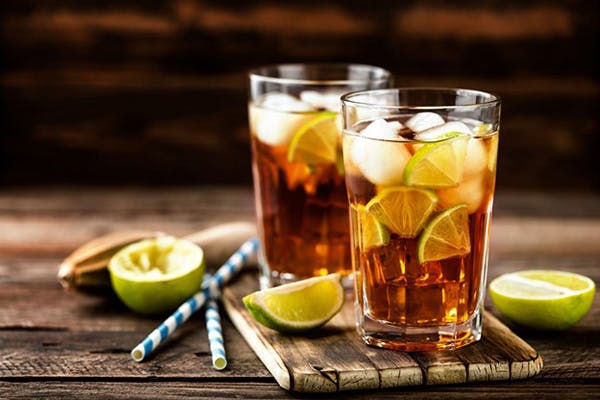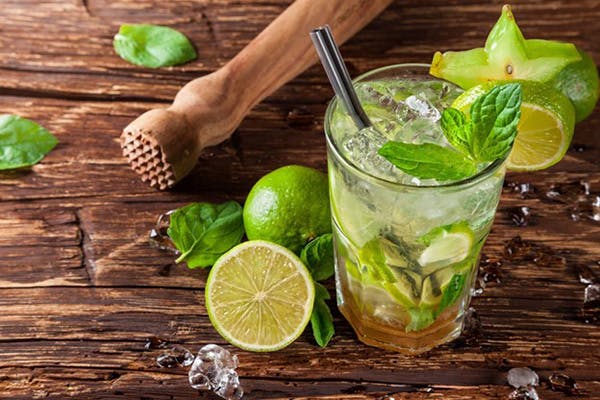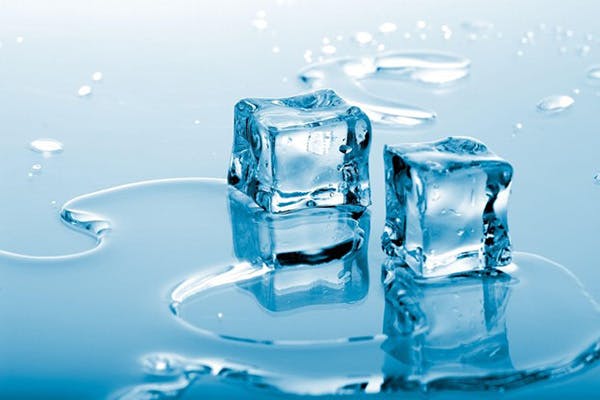November 2022
How to Make the Ideal Ice for Cocktails at Home
There’s an undeniable luxury to a carefully crafted cocktail. From its appearance to its aroma to its taste, a well-made cocktail can hit the spot after a long day of work, or to celebrate a special occasion.
To make the perfect cocktail, you’ll need to start with the right recipe and high-quality ingredients. Any mixologist will tell you that a perfect old-fashioned, margarita, mint julep, mojito, or negroni needs well-crafted liquor, delicious mixers, and the right garnishes.
But we often forget that the perfect cocktail also needs the perfect ice. So let’s take some time to focus on why cocktail ice is so important and how to make the absolute best ice for cocktails from the comfort of your own home.
Why Do You Put Ice in Cocktails?
First things first, let’s talk about why we use cocktail ice in the first place. If you’re familiar with the wide world of cocktails, then you’ll already know that many cocktails won’t have ice at all. Some people prefer their spirits “neat,” which generally means without any blocks of ice whatsoever.
But a wide variety of cocktails include ice at some point in their creation. Ice cubes can serve a number of functions for a mixologist. The first use for cocktail ice is also the most obvious: Ice cools down a drink.
For many cocktails, a cooler temperature improves the overall flavor and enjoyment of the drink. To illustrate the point, imagine having two margaritas in front of you, one chilled with crystal-clear ice cubes, and the other without ice, sitting at room temperature. Most people would choose the cold cocktail.
Cocktail ice can also play a role in the dilution of the spirits in your cocktail. This occurs when the surface area of your ice cubes or ice spheres is exposed to the room-temperature spirit you’re using in your cocktail. As your ice melts, it becomes water, and dilution of the spirit occurs.
Experienced mixologists will account for this dilution when creating the cocktail, and as a result they rely on cocktail ice to balance out the flavors of the cocktail and the cocktail’s strength, as well.
Does Ice in Alcohol Make It Stronger?
Speaking of dilution, we should clear up a frequently asked question: Adding ice to alcohol does not make it stronger. Just the opposite, in fact: As the ice melts and becomes water, this water dilutes the alcohol present in your drink.
In the world of mixology, this is said to “weaken” the drink: It lowers the alcohol content by volume. The less ice you use in your cocktail glass, the stronger your drink will be by volume. Conversely, the more cocktail ice you use, the weaker your cocktail will be by volume. Don’t be mistaken though, while the drink may be diluted and taste weaker, the amount of alcohol in your drink has not changed.
Do the Types of Water You Use for Ice for Cocktails Matter?
In a word, yes. The type of water you use for your cocktail ice is critically important. When it comes down to it, you have two options for the water you use to create ice for cocktails: tap water or filtered water. Let’s take each in turn.
Tap Water
Using tap water for your cocktail ice is one of the biggest mistakes amateur mixologists make. Tap water carries within it a wide range of impurities, including sediment, heavy metals, chemicals, and harmful contaminants.
Impurities affect the taste, color, and odor of tap water, and if you’re using tap water to make your ice for cocktails, the impurities present in your tap water are going to affect the taste, color, and odor of your cocktail as well.
Filtered Water
Thankfully, there’s an easy solution to this problem: using filtered water for your cocktail ice instead. When you filter water, you remove the harmful contaminants from your tap water, making it healthier and better tasting.
There are many ways to filter your water, too. You can use a countertop pitcher filtration system, or purchase bottled or distilled water (that has been filtered at a commercial scale).
But if you’re interested in using the very best filtered water available, you should consider investing in an under counter or whole home filtration system. If you source your filtered water from one of these systems, you’ll enjoy healthier, better-tasting water for more than just your cocktail ice.
HomeWater is an industry leader in home filtration systems. Check out HomeWater’s website to learn more about how you can start protecting your health and the health of your family (in addition to upping your cocktail ice game!) by installing a HomeWater filtration system.
Are There Different Types of Ice for Cocktails?
Not all ice is created equal. There are, in fact, many different types of ice you can use for your craft cocktails. Here are some of the most common types of cocktail ice you’ll come across.
Cocktail Ice From an Ice Cube Tray or Ice Maker
The easiest way to make ice for cocktails is to use your freezer’s ice maker or an ice cube tray in your freezer. Most households will have an ice cube tray already (or a freezer with a built-in ice maker).
While this is the simplest and easiest way to make ice for cocktails, it won’t elevate your drinks much. Let’s dig deeper into the world of cocktail ice to learn what mixologists do to elevate their craft cocktails.
Cocktail Ice From an Ice Mold
If you’ve been to a cocktail bar recently, you may have noticed some strangely shaped ice balls or large ice cubes in your highball cocktail glass.
These ice balls or large ice cubes look great, but they also serve an important function: these forms of ice for cocktails generally have a smaller surface area than normal ice cubes. A smaller surface area means a smaller portion of the cocktail ice is exposed to the liquid in your drink, which makes for slower-melting ice.
For cocktail enthusiasts who aren’t fans of dilution, these slower-melting ice cubes and ice spheres are a great way to cool down their drink without weakening it.
To make this kind of cocktail ice at home, you’ll need to invest in an ice mold or two. Oftentimes these ice molds are made of silicone, and they allow home mixologists to get creative with the shapes of their cocktail ice, just like you’d see at a cocktail bar.
Crushed Ice
Some cocktail recipes will call for crushed ice, or even blended ice. These cocktails (think daiquiris or margaritas) are generally served much colder than the average cocktail. Crushed ice is a great way to significantly decrease the temperature of your drink.
Cloudy Ice
The most common kind of ice for cocktails is cloudy ice. If you’re freezing water in your freezer — whether in ice cube trays or ice molds — chances are good you’re making cloudy ice cubes.
Cloudy ice looks opaque because it contains impurities trapped within it from water and, most importantly, air bubbles. These air bubbles make it difficult to see through your ice cube, giving it that cloudy effect.
Clear Ice
If you care about the aesthetics of your craft cocktail, then you’ll want to use clear ice cubes. Clear ice lacks the impurities and air bubbles that cloudy ice contains, and it can really elevate a drink.
How Do You Make Clear Ice Cubes?
Given the choice, any mixologist — whether amateur or professional — would likely choose clear ice over cloudy ice for their creations. But how do you make clear ice cubes?
As we mentioned before, ice turns cloudy when it contains impurities and air bubbles. To make clear ice, we’ll need to tackle both of these problems.
To eliminate the impurities in your ice for cocktails, you’ll want to filter your water. We went over the best ways to do this, but as a reminder, HomeWater is an industry leader in bringing professional-grade filtered water into your home.
Once you have your filtered water, it’ll be time to tackle the air bubbles. There are a number of ways to do this, and if you’re interested in a deep dive on the subject, you can read our guide on making clear ice.
But the short answer to this problem is to practice directional freezing. In a typical ice cube tray, water freezes from the outside of the cube moving inward. As the outer edges of the cube freeze, they force air bubbles inward. The end result is fully frozen ice cubes that trap these air bubbles inside, making them cloudy and opaque.
To make a clear ice cube, you need to tap into directional freezing. Fancy ice machines can do this for you, but if you want a DIY solution, try this: Put a layer of water inside an insulated cooler. Then, leaving the lid of this cooler uncovered, place it inside your freezer.
Because the water in this cooler is insulated on every side but the top, the water will freeze from the top down. This will force the air bubbles to the bottom layer of your frozen water, which you can remove with a mallet and an ice pick.
Once you remove this bottom layer of cloudy ice, you’ll be left with a sheet of crystal-clear ice, perfect for your cocktails.
Ready to Make Perfect Ice for Cocktails?
Hopefully by this point we’ve established just how important ice is for cocktails. Ice can make or break a craft cocktail, but you don’t need to rely on an award-winning mixologist at a Manhattan cocktail bar to add the perfect ice to your perfect drink.
We’ve given you all the tips you need to make great ice for cocktails, but if you only remember one thing from this guide, make sure it’s this: Use filtered water to make your ice for cocktails.
Filtered water doesn’t just taste and look better than tap water, it’s also healthier. So if you’re really serious about making the perfect ice for cocktails at home, your first stop should be the HomeWater website.
While there, you can find the perfect home filtration system that will immediately improve the quality of the water you drink and use at home — and will elevate the ice you use for cocktails to professional levels.
Brought to you by homewater.com
All images licensed from Adobe Stock.


